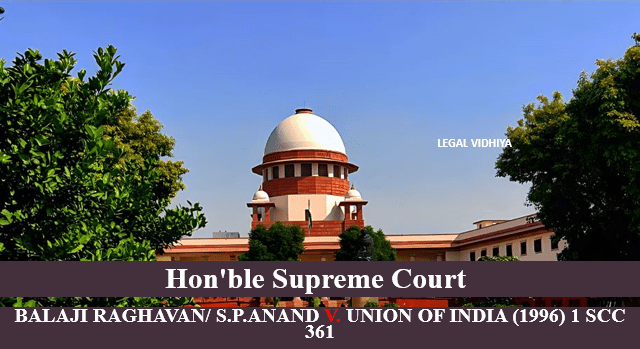
| CITATION | (1996) 1 SCC 361 |
| DATE | 15 December 1995 |
| COURT | Supreme Court of India. |
| CASE TYPE | Civil Petition. |
| CASE NO. | Transfer petition (civil) 09 of 1994 with 1 of 1995, D/-15-12-1995 |
| PETITIONER | Balaji Raghavan / S.P.Anand. |
| RESPONDENT | Union of India. |
| BENCH | A.M.Ahamdi Cji & Kuldip Singh & B.P.Jeevan Reddy & N.P.Singh & S.Saghir Ahmad. |
| REFERRED | Article 12, Article 14, Article 18, Article 226 of Indian Constitution. |
INTRODUCTION
The case which has been discussed talks about ‘Title’. A Title is something which is attached to a person’s name either prefix or suffix. The process of attaching titles to a name has been followed since olden times. Titles were used in order to denote superior positions to special people with some distinguished skills. Thus this type of titles started creating discrimination amongst common people which later lead to Inequality.
Article 18 under Part III (Fundamental Rights) of the Indian Constitution deals with the Prohibition followed by state from conferring any title on citizens of India and also from accepting such titles given by any other foreign country except in case of approval by the President of India.
FACTS
A petition was filed by the petitioner, in the High Court of Kerala, under Article 226 of the Indian Constitution through writ of Mandamus to prevent the respondent from endowing any National Award. This practice of instituting a National Award was carried out even before the adoption of the Indian Constitution.
A press note was issued by the Government of India for carrying out the practice of using Civilian awards such as Padma Vibhushan, Padma Bhushan, Padma Shri and so on as titles on invitations, books, letterheads, etc. which is against the scheme of the government as the awards are not titles. Later on the institutions of National Awards were cancelled. On 25th January, 1980 Government of India revived the cancelled awards. Since then, the National Awards are being conferred annually on Republic Day.
ISSUES
- Whether the Awards like Padma Vibhushan, Padma Bhushan, Padma Shri, Bharat Ratna come under the ambit of Article 18 (1) of the Indian Constitution as Title?
ARGUMENTS
- PETITIONER
- In the Constitution there is no distinction between Awards and Titles and is nowhere defined as such.
- The conferment of the National Awards creates unnecessary distinctions between the citizens.
- Such a distinction has been giving rise to violation of Article 14 i.e Equality before Law and Equal Protection of Law.
- RESPONDENT
- The Awards are granted for the contribution of people in the fields of Arts, Science, Literature, etc to encourage them to contribute in such outstanding work.
- The exemption under Article 18(1) holds a viewpoint of Utilitarianism Theory (Greatest Happiness for Greatest Number of people).
JUDGMENT
The Writ Petition was disposed of. It was held that the National Awards do not amount to ‘Titles’ within the meaning of Article 18(1) of the Indian Constitution but the same should be given after examining on the basis of merit and without biasness, the recognition of excellence in the performances of the citizens should be given priority. No award should be granted except on the recommendation of the National Committee. The recommendation should also have approval of the Prime Minister and the President of India.
The court was of the opinion that the National Awards do not violate the principles of the Article 14 of the Indian Constitution.
CONCLUSION
The awards which are granted do not create any kind of discrimination but it creates positive discrimination between citizens to acknowledge their contribution in the fields of Arts, Science, Literature and many more fields. Thus, awarding can be called as healthy competition which is valid and does not violate Article 14 of the Indian Constitution but the same should be granted with proper examination of a particular person.
REFERENCE
This Article is written by Sakshi A Mirgal of B.C.Thakur college of Law, New Panvel (University of Mumbai), Intern at Legal Vidhiya.




0 Comments